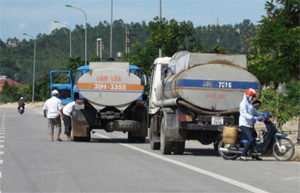Ministry may ban some petrol re-exports
 |
| (source: Vnexpress) |
Deputy Minister of Finance Hoang Anh Tuan said last week that there exist gaps in the regulations of temporary importing and re-exporting that enterprises can take advantage of.
According to deputy director of Sai Gon Port Zone 3's Customs Department Pham Van Hong, current regulations do not ban the transference of temporary import oil and petrol for re-export into goods to be sold in the domestic market.
Due to the huge difference in petrol import tax during the first eight months of this year (the tax increased from 0 per cent to currently 12 per cent), many enterprises prefer selling temporary-import oil and petrol in the domestic market to re-exporting as they can earn bigger profits, according to the ministry.
Previously, the Ho Chi Minh City Department of Customs revealed many cases in which a large part of temporary import oil and petrol was sold in the domestic market, reporting that the total volume sold might be up to thousands of tonnes.
To improve the situation, the General Department of Customs has begun inspections of wholesale petrol enterprises nation-wide to verify the import and export amounts and tackle violations. The findings are expected to be announced this month.
The proposal to ban the temporary import for re-export of oil and petrol transported by sea is also expected to help.
Tuan pointed out that the temporary import for re-export of petrol to Laos or Cambodia might be reasonable because these countries are far from sea ports.
According to the ministry, besides oil and petrol, temporary importing and re-exporting remained a headache in Vietnam, which has seen a sudden rise in the goods value during the past five years, from $1.3 billion in 2006 to $6.3 billion in 2011. The figure for the first half of this year was reported up to $3.85 billion.
Recently, more than 1,000 batches of temporary import goods were found not to have been re-exported in major ports. There were 167 containers of prohibited goods and dozens of containers of frozen goods lacking food hygiene and safety standard stamps.
The ministry also said regulations and laws on temporary importing and re-exporting must be tightened.
What the stars mean:
★ Poor ★ ★ Promising ★★★ Good ★★★★ Very good ★★★★★ Exceptional
Related Contents
Latest News
More News
- Hermes joins Long Thanh cargo terminal development (February 04, 2026 | 15:59)
- SCG enhances production and distribution in Vietnam (February 04, 2026 | 08:00)
- UNIVACCO strengthens Asia expansion with Vietnam facility (February 03, 2026 | 08:00)
- Cai Mep Ha Port project wins approval with $1.95bn investment (February 02, 2026 | 16:17)
- Repositioning Vietnam in Asia’s manufacturing race (February 02, 2026 | 16:00)
- Manufacturing growth remains solid in early 2026 (February 02, 2026 | 15:28)
- Navigating venture capital trends across the continent (February 02, 2026 | 14:00)
- Motivations to achieve high growth (February 02, 2026 | 11:00)
- Capacity and regulations among British areas of expertise in IFCs (February 02, 2026 | 09:09)
- Transition underway in German investment across Vietnam (February 02, 2026 | 08:00)

 Tag:
Tag:




















 Mobile Version
Mobile Version